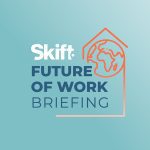Skift Take
Hotels have a serious, and highly caffeinated, competitor on their hands.

Future of Work
As organizations start to embrace distributed work and virtual meetings, the corporate travel and meetings sectors are preparing for change. Read Skift’s ongoing coverage of this shift in business travel behavior through the lens of both brands and consumers.
Hotels have made great strides adapting to remote workers during the pandemic, but coffee shops are evolving too. Now, new design features are spreading out into the wider hospitality sector, according to one architect. Goodbye grab-and-go, hello comfy seating and hangout areas.
Many employees flocked to the likes of Starbucks and Pret A Manger. But in Washington, D.C., a multidisciplinary practice called //3877 is specializing in designing cafes fit for the modern remote worker. And it’s never been busier.
The architect works with brands like Slipstream and Freshman. “A lot of our clients are cafes that do a lot more day-to-night. As the demand changed, they expanded with that,” said co-founder David Tracz.
“They’ve changed their entire program. They do full cafe service in the morning, then all the way until night with a food and cocktail program. And people who live around there use it as a good workspace, they work all day, from the coffee in the morning to cocktails at night.”
The caffeine component is clearly an advantage, kickstarting the day or brainstorming sessions, but Tracz said he was seeing an influx of cafes in the Washington area and other states as well. Coffee shops are asking his practice, which has a mix of interior designers and architects, for a better arrangement for their “to-go” and “pick-up” areas so it doesn’t look like a pile of bags stacked in a corner, he said.
The firm //3877 also works with most of the major hotel groups in the U.S., which are picking up on the fact that many guests will want to “hang out” more. Where a space used to be set aside as a designated breakfast area, that’s now changing.
“You’re going to continue to see the lobby space as much more communal,” the co-founder said. “All the hotel brands are shooting for getting desks, and a comfortable space. In a lot of ways, they’re doing that to reduce the room footprint. That seems to be the move,” he said.
Communities play a role here in the evolution of cafes too, and local favorite Pret A Manger plans to double in size within the next five years, backed by a new $133 million investment. Last summer it cannily launched a subscription model — which even inspired one accommodation provider — and sales have almost returned to pre-pandemic levels.
However, the cafe group told Skift it’s got no plans to tweak its designs, but rather focus on retail, broadening its product range available on delivery platforms such as Deliveroo, Just Eat and Uber Eats, and selling items like frozen croissants, granolas and ketchup in other shops.
“They were always geared for takeaway, anyway,” said Tracz. “I don’t know if they’d want to change their design to a position where people can hang out more often. It’s a tough call.”
Sidenotes
You can tell the end of the year is approaching by the number of quirky press releases and lists arriving in the inbox. One from expense company Emburse stands out — but possibly because it’s not as far-fetched as it sounds.
The company asked its customers for their craziest expenses that submitters and finance professionals encountered throughout the year. They included $1,000 for a tattoo removal for an incoming employee, $1,250 for pet sitting care for an employee’s horse with separation anxiety. Meanwhile, one newly hired employee charged $25,000 onto the company card for a car, and another $85 to repair lawn damage caused by a visiting coworker attending a private dinner party.
The smallest? A nail worth 53 cents submitted as an expense for an office construction project.
Obviously if you ask 100,000 people these types of questions, you’ll get made-up answers, and clear signs of company fraud, but, as Emburse points out, some may have something to do with the “Great Resignation.” If the war for talent is as competitive as everyone’s saying, is this a sign of things to come? Industry leaders discussed this very topic at Skift Aviation Forum last month, and how travel overlaps with a very real battle to retain and recruit talent in a tight labor market. Maybe it’s not quite the end of business-class flying just yet.
10-Second Corporate Travel Catch-Up
Who and what Skift has covered over the past week: Amadeus, Allegiant Air, Alloggio, Azul, EveryMundo, EY, Global Business Travel Association, KPMG, Meituan, Omicron variant, Selina, United Airlines, Vacasa.
In Brief
TravelManagers Gets Back to Business in Australia
Australia’s TravelManagers group is producing a series of webinars for its consultants, with training on fares, ticketing, marketing, risk mitigation and service fees, according to reports, as the country slowly reopens its borders. The travel company has also teamed up with with Amadeus and Healius Pathology to discuss safe travel and accredited Covid travel tests as part of its “Reset” program. “Our personal travel managers need to feel confident in their approach to navigating the complexities of travel in a Covid-normal world,” said Michael Gazal, executive general manager.
The Daily Newsletter
Our daily coverage of the global travel industry. Written by editors and analysts from across Skift’s brands.
Have a confidential tip for Skift? Get in touch
Tags: accommodations, amadeus, business travel, coronavirus, corporate travel, Future of Work Briefing, remote work, Skift Pro Columns, ubereats